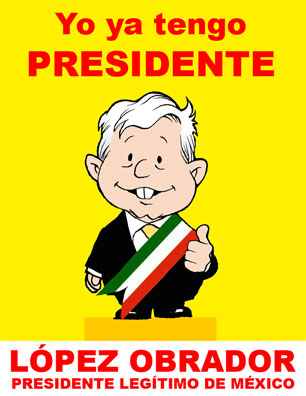ESTE ES MEXICO ANTE EL MUNDO...
 |
Its politics were dominated for 70 years by the Institutional Revolutionary Party, or PRI. But elections in 1997 saw a resurgent opposition break what was in effect a one-party system with a democratic facade.
Elections in 2000 confirmed the trend when Vicente Fox became the first president to come from the opposition.
OVERVIEWMexico is a major oil producer and exporter. Nearly one-third of government revenue comes from the industry. Much of the crude is bought by the US.
But prosperity remains a dream for most Mexicans. Rural areas are often neglected and huge shanty towns ring the cities.
Many poor Mexicans try to cross the 3,000-km border with the US in search of a job, and more than a million are arrested every year. Hundreds die of heat exhaustion or thirst while making the attempt.
The exodus can lead to some towns and villages in Mexico being virtually empty of able-bodied men. The impact on the families left behind is worrying for the authorities. Poor and rural areas rely on the money sent home by the millions of Mexicans working in the US.
President Fox has urged the US to take a more lenient approach to immigration and has opposed what he calls the militarisation of the border.
Another persistent issue has been the pressure for greater rights for Mexico's indigenous people. A law passed in 2001 fell short of giving Mexico's Indians political autonomy.
However, demands for indigenous rights have been largely peaceful since 1994, when at least 150 people died during an uprising in the southern state of Chiapas, led by the Zapatista rebel movement.
Violent crime is a major concern; Mexico has one of the highest rates of kidnappings in the world. Turf wars between rival drug cartels are said to lie behind many gangland killings.
Writers such as Octavio Paz and Carlos Fuentes, the mural-painter Diego Rivera, and popular ranchero and mariachi music mean that Mexican culture is known throughout the Spanish-speaking world and beyond.
- Full name: United Mexican States
- Population: 106.4 million (UN, 2005)
- Capital: Mexico City
- Area: 1.96 million sq km (758,449 sq miles)
- Major language: Spanish
- Major religion: Christianity
- Life expectancy: 72 years (men), 77 years (women) (UN)
- Monetary unit: 1 peso = 100 centavos
- Main exports: Machinery and transport equipment, mineral fuels and lubricants, food and live animals
- GNI per capita: US $7,310 (World Bank, 2006)
- Internet domain: .mx
- International dialling code: +52
President-elect: Felipe Calderon
President (outgoing): Vicente Fox
Felipe Calderon, from the governing, conservative National Action Party, was declared the winner of the bitterly-fought July 2006 presidential election with a lead of less than 1% over his left-wing rival, Andres Manuel Lopez Obrador. His win was confirmed after weeks of legal wrangling. He will take office on 1 December. 
Mr Calderon says he wants to strive for unity; he has offered to include opposition politicians in government. Mr Obrador, a populist former mayor of Mexico City, challenged the poll outcome in the courts and led a campaign of street protests.
The incumbent leader, Vicente Fox, took office in December 2000. He ordered his government to improve the distribution of income and to tackle corruption and crime.
But the National Action Party suffered a humiliating defeat in mid-term parliamentary elections in 2003, putting a damper on his plans for economic, labour and energy reforms.
Mr Fox has been praised for tackling some of Mexico's top drugs barons, but his government has struggled to contain drug-related crime. In 2005 the president said drugs cartels were trying to infiltrate state institutions, including his own office. 
President Fox has maintained close relations with the US, although he did not back the American-led war in Iraq. But some of his ideas - such as opening the border and introducing temporary work visas for Mexican labourers - have had a lukewarm reception in Washington.
He was unable by law to run in the 2006 poll.
MEDIA |
Mexico's media were traditionally dominated by the Televisa group, which had firm links with the PRI. But the loosening of the PRI's hold led to greater editorial independence and the emergence of competitors.
Televisa once had a virtual monopoly in Mexican TV, and remains a major global supplier of programmes in Spanish. New players - such as the Azteca group and foreign satellite and cable operators - have mounted an assault on Televisa's dominance.
The radio market is very large, with around 1,400 local and regional stations and several major station-owning groups. Some high-powered stations on Mexico's northern border beam their signals into lucrative US markets.
Mexican newspapers reflect different political views; sensationalism characterises the biggest-selling dailies.
The media watchdog Reporters Without Borders noted in 2005 that Mexico's local and regional media were vulnerable to pressure and attacks from criminals, politicians and police.
The press
Television
Radio
News agencies

Felipe Calderon looks good on paper - but can he boost the economy?













0 Comments:
Publicar un comentario
<< Home